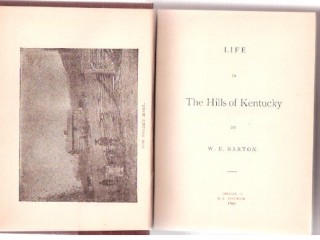
William Eleazar Barton biography
Date of birth : 1861-06-28
Date of death : 1930-12-07
Birthplace : Illinois, United States
Nationality : American
Category : Famous Figures
Last modified : 2010-06-10
Credited as : Clergyman and author, Abraham Lincoln biography,
0 votes so far
Barton, William Eleazar (June 28, 1861 - Dec. 7, 1930), clergyman and author, was born in Sublette, Ill., the eldest of the five children of Jacob Bostedo and Helen (Methven) Barton.
He was descended from Lieut. William Barton, of English birth, who after the Revolution settled in New Jersey. His father was a physician, druggist, postmaster, and small farmer; his mother, of Scottish birth, was a descendant of Alexander Selkirk. Because of a disagreement with his father, William left home at the age of sixteen, worked for farmers, taught school, and prepared for college at Stillman Valley Academy, from which he entered Berea College in 1881. He supported himself in college by doing odd jobs, teaching, and selling books. During his senior year he decided to enter the ministry and was ordained on June 6, 1885, three weeks before his graduation. His first church was at Robbins, Tenn., where he gained the confidence of the mountain people by his understanding and sympathetic approach. In 1887 he entered Oberlin Theological Seminary and graduated in 1890 at the head of his class. During his seminary course he preached in a small church at Litchfield, Ohio, where he began his life as a lecturer and writer. From 1890 to 1893 he was pastor at Wellington, Ohio, at the same time serving as lecturer in church history at Oberlin Seminary. On the latter date he became pastor of the Shawmut Church in Boston. In 1899 he was called to the First Congregational Church at Oak Park, Ill., where he remained till 1924, taking the church divided and in debt and leaving it at the close of his pastorate one of the strong churches of his denomination. During these years he gave lectures on applied practical theology (1905-09) and ecclesiastical law (1911-24), at the Chicago Theological Seminary. In 1928 he became lecturer at Vanderbilt University at Nashville, Tenn., where he also organized and became pastor of the Collegeside Congregational Church.
Barton's publications comprise sixty volumes on a wide range of subjects. Probably his most widely read works are his "Parables of Safed the Sage," short humorous essays dealing with commonplace characters and situations but written in semi-archaic language. They appeared first in periodicals and later were collected and issued in book form as The Parables of Safed the Sage (1917); The Wit and Wisdom of Safed the Sage (1919); Safed and Keturah (1921); More Parables of Safed the Sage (1923); and Fun and Philosophy of Safed the Sage (1925). As a leading authority on the history and polity of his denomination Barton wrote A Pocket Congregational Manual (1910); Rules of Order for Ecclesiastical Assemblies (1910); The Law of Congregational Usage (1916); and Congregational Creeds and Covenants (1917).
It is as the biographer of Abraham Lincoln that Barton holds his surest title to remembrance. His experience in the mountains of Kentucky and Tennessee gave him an unusual comprehension of the atmosphere in which Lincoln grew up, and it has been said that no other biographer understood those early years better than he. The following are his published works on Lincoln: The Soul of Abraham Lincoln (1920); Abraham Lincoln and His Books (1920); The Paternity of Abraham Lincoln (1920); The Influence of Chicago upon Abraham Lincoln (1923); The Life of Abraham Lincoln (2 vols., 1925); A Beautiful Blunder: The True Story of Lincoln's Letter to Mrs. Lydia A. Bixby (1926); The Great and Good Man (1927); The Women Lincoln Loved (1927); Abraham Lincoln and Walt Whitman (1928); Abraham Lincoln and the Hooker Letter (1928); The Lincoln of the Biographers (1930), containing a bibliography of the Lincoln biographies; and Lincoln at Gettysburg (1930).
At various times Barton was associated with the Youth's Companion, the Bibliotheca Sacra, the Congregationalist, and the Advance, either as a contributor or in an editorial capacity, and from 1913 to 1917 he was editor-in-chief of the Advance. He was a trustee of Chicago Theological Seminary, Berea College, and the Union Theological College of Chicago. He was a member of many religious and philanthropic societies, a delegate to the Congregational National Council for fourteen sessions, and moderator of the latter from 1921 to 1923. He wrote and lectured on a great variety of subjects. At the time of his death it was said of him that "few men have exercised a wider influence in the religious life of the United States" (Presbyterian Advance, Dec. 18, 1930). He was a man of imposing appearance, tall and bearded, and his presence was felt in any company. He died of pneumonia, following serious heart trouble, at the Long Island College Hospital in Brooklyn. He had married, on July 23, 1885, Esther Treat Bushnell who died Nov. 27, 1925. Their family of four sons and one daughter, Bruce, Charles, Helen, Fred, and Robert, survived them.
















